Does anybody even read poetry anymore? According to a National Endowment for the Arts report, 11.7% of US adults read poetry. That’s more than 1 in 10 people!
Even I was shocked by this statistic. But the truth is people are still reading poetry, and the best way to get your poems out there is through a blog.
Now I know what you’re thinking: Doesn’t it take a lot of time and money to put a blog together?
I used to think the same thing, but the truth is that creating a poetry blog doesn’t have to be expensive, and you don’t even have to know how to code. Many platforms use touch and click to make publishing blogs easy for even the most inexperienced blogger.
So what are you waiting for? Dive deep into your depths and learn how to start a poetry blog without breaking the bank!
Editors Note
This guide is extremely DETAILED and explains everything you need to start a Poetry blog. I’ve been at this blogging stuff for over 8 years and have built a business making $20,000 per month, so I have a lot of helpful advice for you newbies out there.
If you get stuck or need advice, I HIGHLY recommend that you get my 100% FREE blogging course by clicking here. If that doesn’t help please contact me directly and I’ll help you out for free.
How to Start a Poetry Blog in 10 Steps:
Below is a table of contents to help you navigate this guide. If you need someone to walk you through setting up your first blog quickly and easily, check out step 5.
Starting a blog allows you to represent yourself in blogging, which will enable you to attract the perfect audience who will appreciate your work.
Whether you want to discuss your favorite poet, share your own work, or sell some chapbooks, a blog lets you do it all.
But before we dive into the ten steps to start your own poetry blog, let’s look at why people should create one and ensure that we get it right the first time.
Reason #1: Let Your Voice Be Heard
Blogs, in general, are an excellent place for like-minded individuals and freelance writers to connect and share their passions, knowledge, and experiences.
While you can try to get your poems published in a journal or magazine, submissions are often highly selective. Even if you get accepted by a publisher, it can take forever to finally see your good poem published.
However, a poetry blog allows writers to express their passion, share their thoughts, and discuss a myriad of subtopics, such as popular collections, style, and the impact of poetry on the modern world by self-publishing.
Self-publish is a great way to build a following. You can easily use your blog to increase subscribers to your email newsletter or followers on Tumblr, Facebook, Twitter, or your favorite social networks.
Reason #2: Improve Your Writing Skills
As a poet learning the art form of poetry, having a blog can also help you improve your writing skills. Poetry is efficient, so your words must be carefully chosen and placed. This is demonstrated by Mark Twain, who famously said to a correspondent: “I wrote a long letter because I lacked time to write a short one.”
You will simultaneously improve your writing as you continue to tell your story and provide your readers with valuable content.
Reason #3: Make Money
A blog allows you to transform your passion into profit. As a poet, you can make money selling your poetry. There are also many other ways you can make money from your poetry blog, some of which we will look at below.
Most people dream of making money doing something they love, and starting a poetry blog will help you create a consistent source of income for yourself from your writing endeavors.
Those are just a few compelling reasons you might want to start a poetry blog. Now, let’s dive into the ten steps so you can get your blog started right away.
1. Decide the Focus of Your Poetry Blog
The first step in starting a poetry blog is to decide on its focus or direction. There are many different routes that you can take, depending on your goals and desires.
To get started brainstorming the direction of your new blog, ask yourself questions such as:
Which are the main topics that you want to discuss on your blog?
Do you want to include interviews, guest posts, etc.?
What about modern and classic poetry?
What’s the overall aesthetic or tone that you want for your blog?
Thinking about these things will help you capture the essence of exactly what you want your new poetry blog to be.
Take the time to brainstorm, write, and come up with ideas to accomplish that for you. Then, think through each question so you can conceptualize your blog and give it a strong foundation.
Listed below are just a few ideas that are possible ways for you to position your blog.
Go through the list to get some inspiration for the direction you want to take your new poetry blog.
- Poetry Recommendations: If you have a vast knowledge of some fantastic must-read poetry collections, you can use your blog as a platform to share that knowledge with an audience of other poetry lovers.
- Poetry Reviews: Although poetry reviewing can be controversial, it can make one interesting poetry blog. If you love doing poetry reviews, you can choose this as the focus of your blog.
- Writing Poetry: As you will find out below, it’s possible to make money selling your poetry. You can follow in the footsteps of poets like Rupi Kaur, who has 2.7 million Instagram followers and has sold over 1 million books and tickets to her famous speaking tours.
- Criticizing Poetry: If you are excellent at understanding the meaning of poems, analyzing them, and offering suggestions from the reader’s point of view, then the focus of your blog can be criticizing poetry.
By visualizing what you want your poetry blog to be, you will be able to make a choice that is best to ensure the success of your blog in the long term.
2. Choose Your Poetry Niche
Your next step when you do write poetry blog is to choose your poetry niche. There are many different types of poems, formats, and forms that you can focus on with your poetry blog, and these include:
- Ballad: This is a good poem that tells short stories. Ballads are usually sung.
- Free Verse: Free verse has a poetic technique/form where the poet doesn’t follow the conventions of rhyme. Free verse is not to be confused with blank verse.
- Blank Verse: This is a poem that doesn’t rhyme. It’s commonly written in iambic pentameter but can also follow a different meter.
- Haiku: This traditional poetry style is a 3-line poem with five syllables in the first and last lines and seven syllables in the middle.
- Limerick: At its core, a limerick is a 5-line poem that follows a strict meter with an AABBA rhyme scheme.
- Lyric Poem: A lyric poem expresses the writer’s feelings or thoughts and leaves the reader with a single, imaginative impression. Ballads, odes, and sonnets fall under this category.
- Narrative Poem: This poem outlines a story’s sequence of events.
- Acrostic: This relatively new poetry form uses up and down letters to spell a word.
You can choose from these and many other types of poems to get more into the genre. There is no single best poetry niche, so feel free to experiment and find what works for you. After all, if you’re good at it, you will earn money by writing poems. If you are still not sure about the right niche for you, take some time to check out some of these famous poets to gain some inspiration.
- Warsan Shire
- Kaveh Akbar
- Clint Smith
- Morgan Parker
- Danez Smith
- Sarah Kay
- Hanif Abdurraqib
- Safia Elhillo
- Lang Leav
- Maggie Smith
- Aimee Nezhukumatathil
You can also visit some poetry blogs to get an idea of the different niches and categories available. Here is a list of the 100 top poetry blogs online right now.
When you visit PoemShape, for instance, you will find that it is a poetry blog created by a New England poet whose niche is:
“Writing poetry, fables, haiku, and criticism.”
Once you’ve chosen your niche, you can move on to the next stage and start writing your poetry blog.
Don’t worry if you’re not 100% sure about your niche because you can always change it or expand it later. Just do the best you can and move on to the next step.
3. Choose Your Blogging Platform
Now that you know what direction you want to take your poetry blog, it’s time to choose your blogging platform from many great blogging platforms in the market.
Your poetry blog needs a home on the Internet. That’s what your blogging platform is. There are free and paid blogging platforms with their own pros and cons.
And while you can “rent” a home for your blog by using free blogging platforms like Blogger, Wix, and Squarespace, it’s always a better alternative to actually “build” your own house by using a self-hosted blogging platform.
The reason for this is that free blogging options often come with a host of drawbacks, such as:
- Poor customization abilities
- Unprofessional look
- Limited capabilities
- Low monetization potential
- Lack of Control over your site
Also, they can delete your account without warning, meaning you’d lose all the content on your site.
As you can see, using free blogging platforms may seem attractive at first, but it has many drawbacks that prevent you from achieving real success with your blog.
However, if you choose a self-hosted blogging platform like WordPress, you will be able to build a website that you can grow and monetize effectively. Here are some of the main benefits of using WordPress:
Benefits of Self-Hosted WordPress Over Free Blogging Alternatives
- WordPress is free and easy for anyone to download and use
- Simple to install and great for beginners with no coding experience
- Tons of free and paid plugins to extend site functionality
- Affordable themes to customize your website easily
- WordPress integrates with countless other apps and services
- Flexibility in monetizing your poetry blog
- Great support from a massive community of developers and users
If you’re still not convinced, take a look at some of these recent WordPress statistics:
- WordPress powers over 60% of all sites built on CMS
- The number of WordPress websites grows by 4% every year
- WordPress sites get at least 400 million visitors every month
- 660 WordPress websites are built every day
- WordPress has over 50,000 plugins to choose from
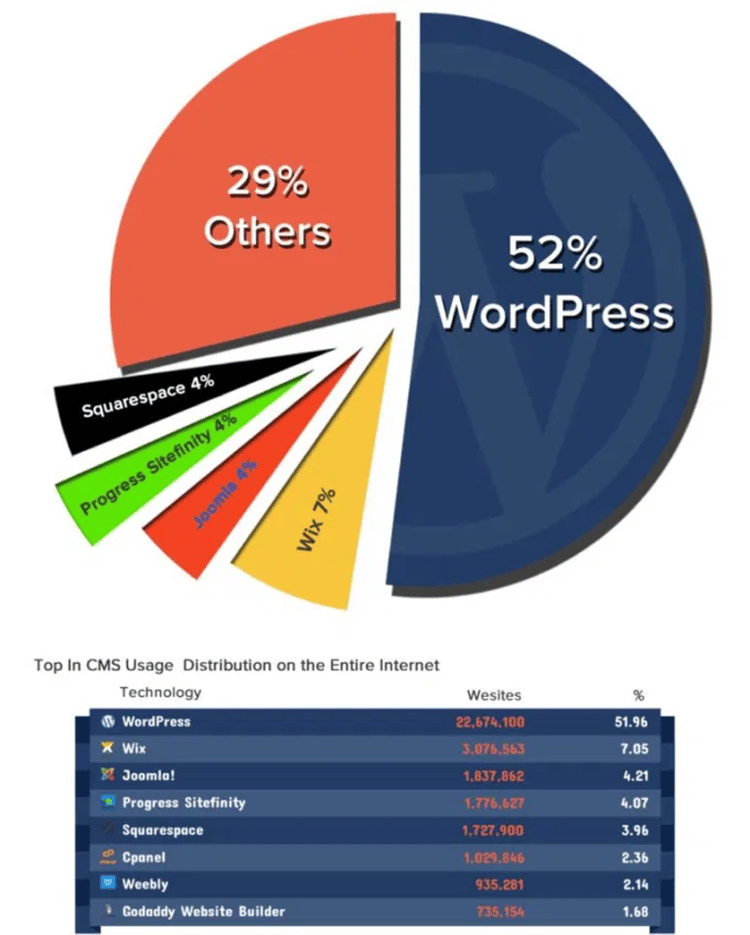
4. Decide Your Domain Name
1. Purchase a (dot) com Domain Name: There are tons of different extensions to choose from for your poetry blog, but it’s always a good idea to stick to the .com extension. There are many reasons for this, the main one being that “.com” is what the Internet was built on, so it’s easier for most people to remember.
2. Choose a Broad Name: Don’t get too specific with your poetry blog name, as that will make it hard for you to grow and expand in the future. For instance, a name like “The Poetry Hub” is better than “Limericks For Life.” But, make sure you still choose a unique and memorable name.
3. Keep the Name Short and Sweet: Shorter domain names are more accessible for people to remember. Try to avoid using too many, long, or complex words or words that are hard to spell.
Ideally, keep your domain name to under 3 or 4 words. For instance, a term like “ShareYourBeautifulPoetryOnline (dot) com” is too long and will be hard for your audience to type into their browsers.
4. Make Use of Alliteration: Alliteration refers to two or more words that start with the same letter or sound. For instance, you could name your poetry blog “Photo Poetry,” “The Poetry Pro,” or something like that.
5. Get creative: If you find that the name you want for your poetry blog is already taken, you can try to get a similar name by calling creative synonyms. Synonyms are words that have the same or similar meaning. So, if you wanted a name like Poetry Hub, you might settle instead for Poetry Web or Poetry Net.
6. Add Extra Words: If all else fails, you can try adding words like “the” “club” or “hub” to your name. For example, “Poetry Online” might become “Poetry Club Online.” This is an excellent way of ensuring you can still get the name you wanted for your new blog.
7. Brainstorm a Concept: One of the best things to help you come up with unique ideas for your new poetry blog is to think of the concept around your blog and what it could be branded as. Think about how it could be more extensive in the future and where it could go. This will help you develop some ideas for what you might call your blog.
8. Use Name Generation Tools: If you are still stuck trying to develop the right name for your new blog, try a great tool like Instant Domain Search and Lean Domain Search. They will help you develop many different ideas for naming your poetry blog.
9. Don’t Buy an Expensive Domain Name: When you are just starting, it can be tempting to purchase an expensive domain name if the one you want is already taken. But, instead of wasting money on a costly domain name, get a standard name and use the money to create content and build your new business. When your business starts generating income, you can purchase any name you want.
10. Don’t Get Stuck at This Stage: You’d be surprised how many people never make it past the step. Choosing a name for your blog should be a reasonably fast decision. Resolve to spend just a couple of hours following the steps outlined above to help you choose the right name, and then move on to the next step.
Examples of Popular Poetry Blog Names (and why they make sense)
- The New Verse: This poetry blog name is simple, short, and easy to remember, thanks to its clever play on words.
- Eat This Poem: This poet combines her love of two things: Poetry and Food, to create a unique name.
- Poetry Pages: This poet used alliteration to develop an excellent name for her blog.
- Ritter’s Rhyme and Reason: As with the example above, this poetry blog name also uses alliteration to make it more memorable.
Here are ten ideas for poetry blog names for even more inspiration:
- Social Ballad
- Green Poetry
- The Shared Pen
- Online Poetry
- All Poetry
- Smart Poetry
- New Line Poetry
- Poetry Team
- Super Poetry
- Simple Verses
5. Buy Your Domain Name and Hosting
Once you’ve decided on a name you like, the next step of starting a poetry blog is buying the domain and hosting.
If your website is your poetry blog’s home on the Internet, your domain name is the home address.
So, if you choose a name like “Poetry Global,” your blog address would be www.PoetryGlobal (dot) com.
The web host can be likened to the real estate on which your poetry blog will be built.
So, when someone types in your website URL, Bluehost will show your blog to the individual who searched for it in search engines.
I’ve created a step-by-step tutorial to walk you through the entire process of buying your domain name and hosting. You first need to click on this link to visit Bluehost and follow the tutorials below.
Below is a YouTube video and screenshots showing you the exact step-by-step process. Then, choose whatever tutorial works best for you.
Step 1: If you haven’t yet, click on this link, and you’ll be brought to the WordPress Hosting page you see below.

Step 2: You’ll be brought to the hosting plan page next. You could choose to get a “Plus” or “Choice Plus” plan, but that’s not a requirement.
The Startup plan is the cheapest at $2.95/month through my link vs. the normal $8.99/month.
This plan has everything you need including 50GB of webspace (plenty of room for your files), a free domain for a year, plus other standard features like a free SSL and a secure WordPress install. Feel free to browse to decide on the right plan, but rest assured that Basic will work just fine if you want to minimize your investment.
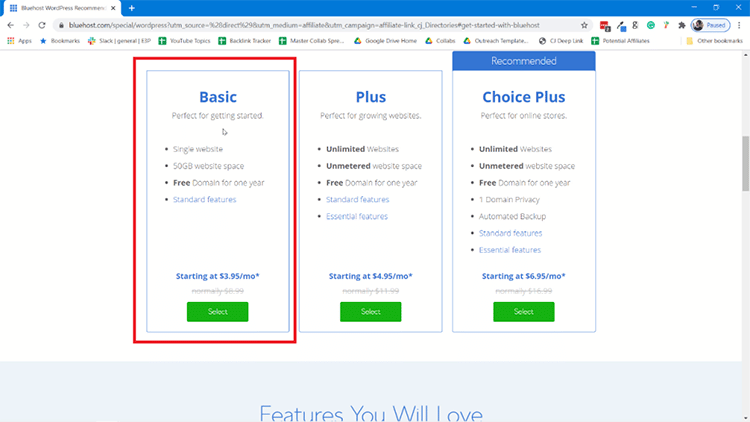
Step 3: After clicking into the plan, you’ll be brought to the next page where you will type in your new domain, or you can choose “I’ll create my domain later” if you haven’t decided on one yet. The domain is the URL people will type into a browser to view your website in the future.
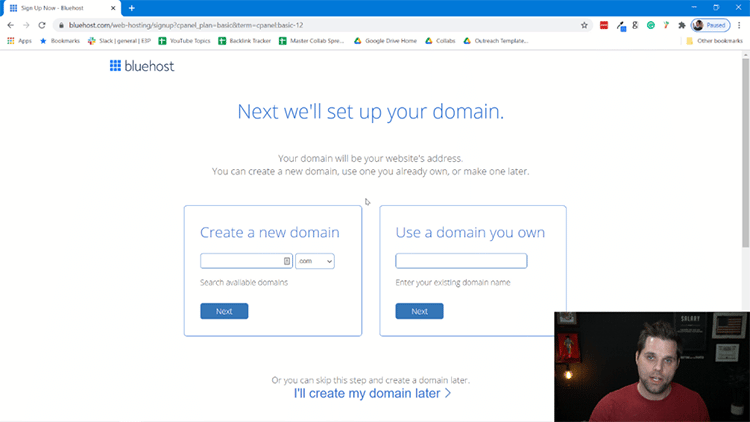
Step 4: Once you submit, the next page will ask for all of your information. That will start with your account information, which is self-explanatory.
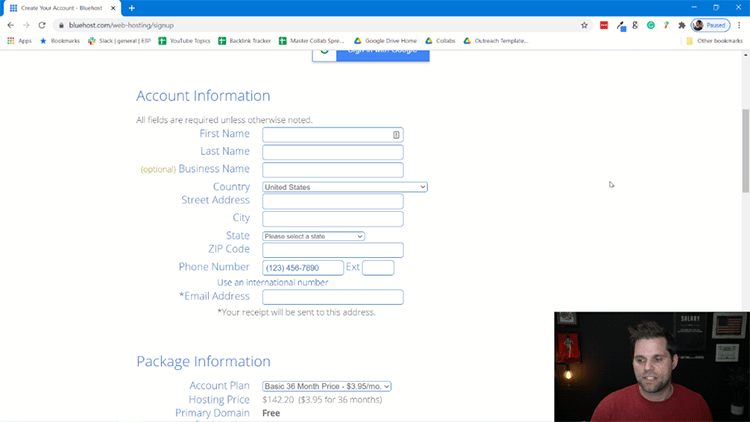
Step 5: Next, you’ll have to input your Package Information. This is to choose how long you want the plan to go. I advise you to choose 24 months to get the discount and save some money, but you can go as low as 12 months if you want.
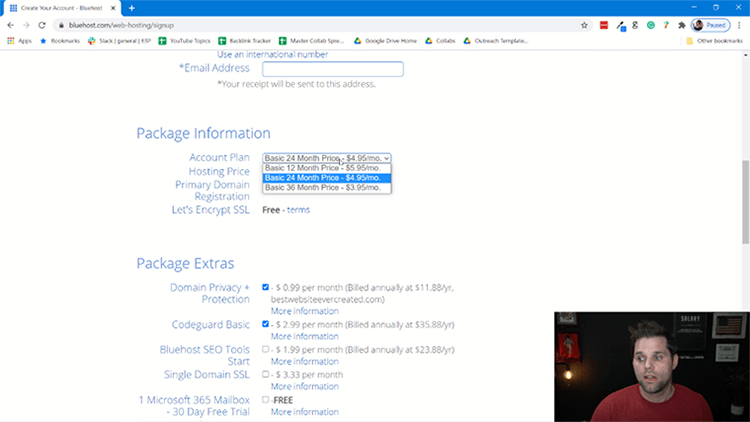
Step 6: You’ll have to choose what “Package Extras” you want. You can scroll over “More Information” to understand each of these items, but here is my advice.
I would get the “Domain Privacy + Protection.” This makes it so that no one can tie your name to the domain name you create. The only other one worth considering is “Codeguard Basic.” The other two I wouldn’t personally get. But choose what is best for you.
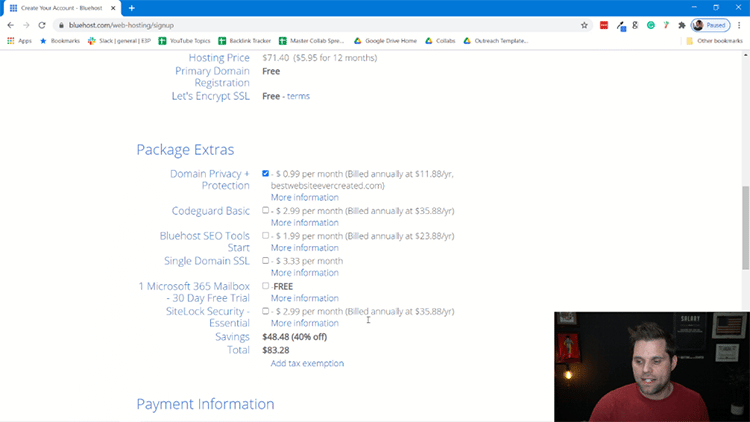
Step 7: The next step after your domain name is Payment Information, which is self-explanatory.
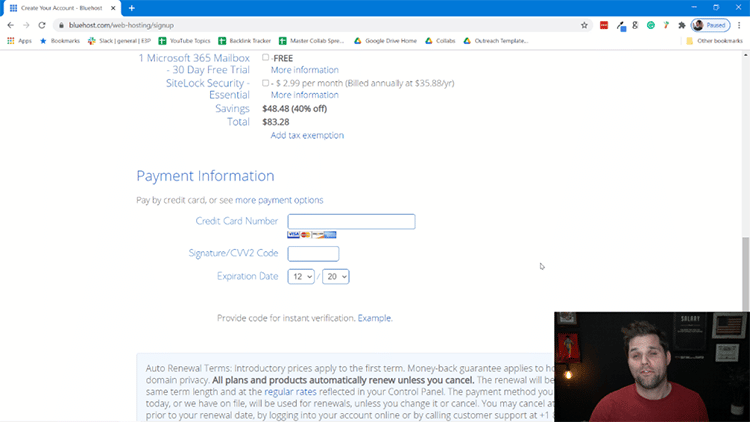
Step 8: The last signup step confirms that you read and understand the Bluehost Terms of Service, Cancellation Policy, and Privacy Notice. Click the check button and then click “Submit.”
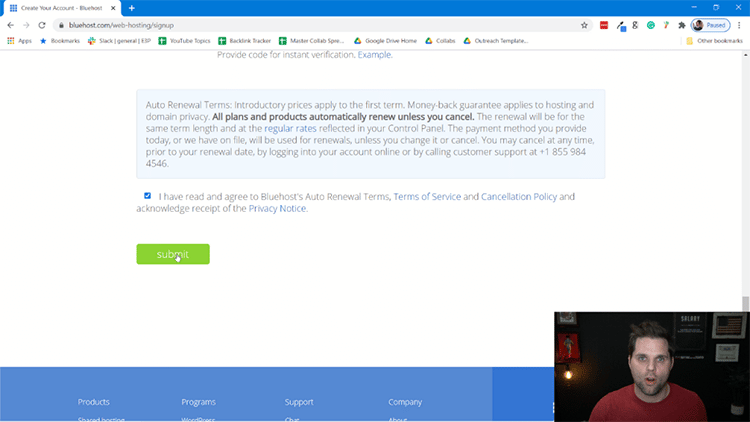
Step 9: Next, you’ll be prompted to create an account and password. You’ll use this information to log in to the Bluehost platform to manage your site and account info.
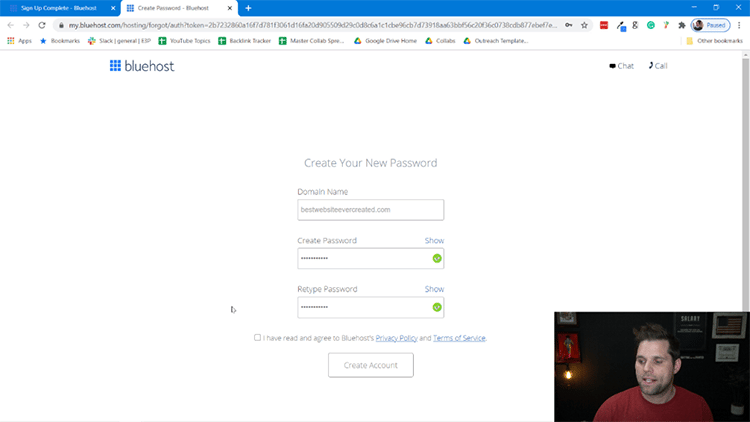
Step 10: At this point, Bluehost puts you through a short questionnaire to better understand your scenario. You can answer these questions or click “Skip this Step” at the bottom. If you’re a newbie, I advise you to answer the questions as it’ll help your onboarding experience.
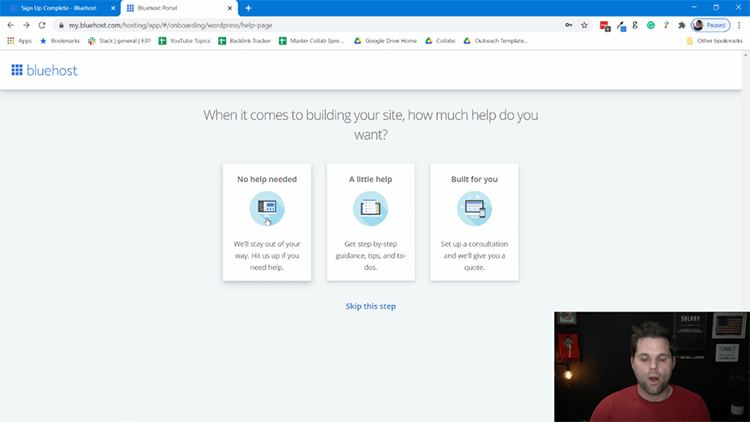
Step 11: After you’re done with that, you’ll be advised to choose a theme. For now, you can choose to use free themes. But, of course, you can always replace the theme later if you’d like.
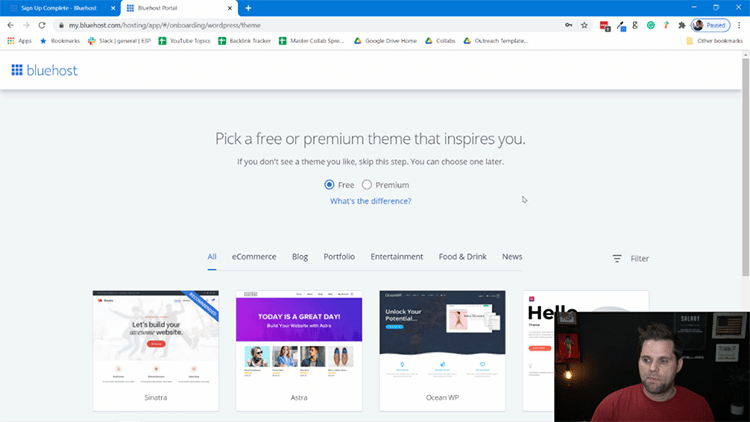
Step 12: From choosing your free theme, you’ll be brought into the backend of WordPress in the admin panel. This is where you’ll manage your site from. You can add posts/pages as you see fit, but when you’re ready, click on the blue button that says “Launch Your Site.”
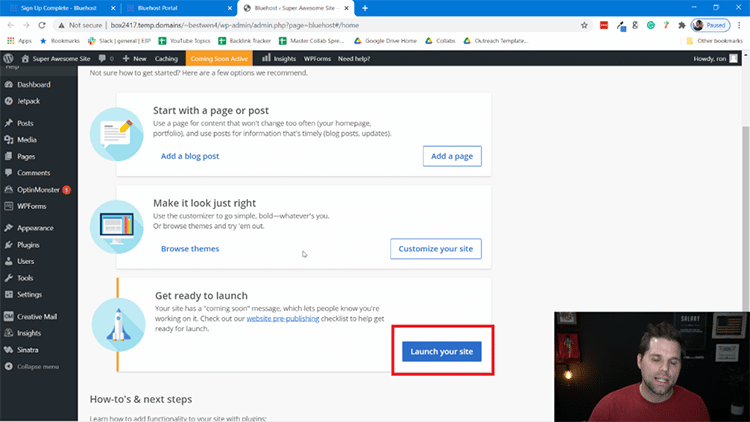
Step 13 (Final): Your blog is LIVE. Just go to a browser and type in your domain name. Once you do this, you’ll be able to access your website!
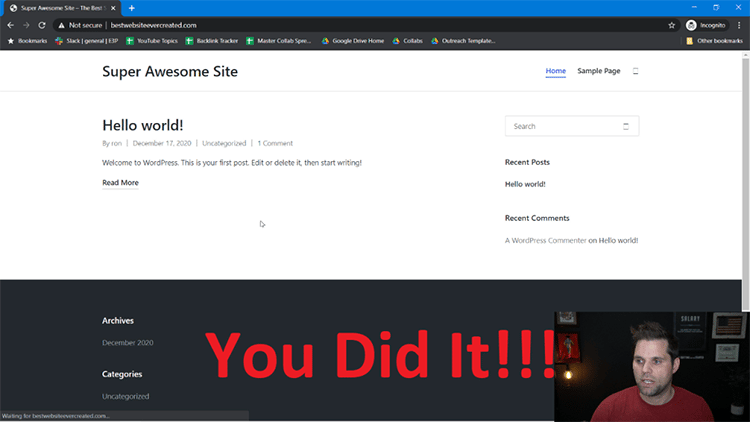
Congrats! You officially have a website.
If you’re wondering how to edit things on the website, all you have to do from here is go to your website URL with /wp-admin at the end in a browser and login to the login page.
Example: http://mostawesomewebsiteever (dot) com/wp-admin
And don’t worry, we cover how to edit things more in the rest of this guide. So please continue reading.
6. Choose and Install a Theme For Your Poetry Blog
A theme is very important when starting a poetry blog. It is simply a template of sorts that dictates how your new blog will look and read. It’s the look you give your website. You might think of it as its “skin.”
The theme dictates the layout of your website and makes it easy for you to swap out photos and text with your own. This means you have a professionally-designed website without learning a single line of code.
As with most other website-building tools, free themes and premium options are available. I suggest going with a premium WordPress theme for a number of reasons:
Benefits of Paid Themes over Free Alternatives for Poetry Blogs
- Unique Designs: Premium WordPress themes have unique, sleek, professional-looking designs.
- User-Friendly: It’s easy to make changes to your site to make it look the way you want without having to learn HTML.
- Mobile-Friendly: All WordPress themes are mobile-responsive and look perfect on all devices.
- SEO Friendly: Premium WordPress themes enhance your SEO (search engine optimization) for a high-ranking website in search engines.
- Customer Support: Paid WordPress themes also come with reliable tech support, ideal for tech-challenged bloggers.
- Enhanced Security: WordPress premium themes have built-in security to fight off any malicious code.
Now that you know all the reasons you need to pick a good premium WordPress theme for your blog, Let’s look at some examples of themes that are great for poetry blogs.
- Divi: If you’re looking to design a stunning website with ease, Divi from Elegant Themes stands out as arguably the best WordPress builder available today. Its intuitive visual drag-and-drop interface empowers users to craft amazing sites quickly. What sets Divi apart is its vast array of customizable modules, real-time design feedback, and a responsive editing feature that ensures your website looks impeccable on any device.
- Astra: While Divi is renowned for its versatile design capabilities, the Astra theme offers a distinct set of advantages for those prioritizing speed, performance, and seamless integration. Astra stands out for its feather-light weight, ensuring that websites load at lightning-fast speeds—a critical factor for SEO and user experience. Moreover, Astra’s deep compatibility with major page builders, including Elementor and Beaver Builder, means that users aren’t restricted to a single design environment. The theme is also built with a focus on customization as well. You can read my Astra Theme Review if you want to learn more.
- Themeforest.net: Themeforest has a significant amount of themes far beyond other platforms out there. There are over 48,000 total themes available on this platform, so you can find whatever you need.
And here are more specific examples, but I highly recommend you consider my list above.
1. Typology – Minimalist WordPress Blog & Text-Based Theme
This insanely popular theme is designed for writers and poets. It’s simple, elegant, and typography-oriented. It has many features to choose from, allowing you to create a distinctive poetry blog.
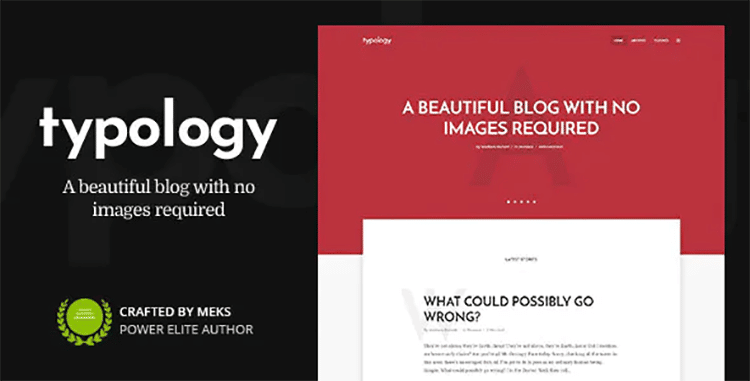
2. Sense – Authority Blog WordPress Theme
The sense theme boasts a content-focused, clean, and sleek design. This WordPress blog theme has excellent typography, advanced theme options, and high readability. You will be able to customize this theme to match your needs quickly.
3. Wild Book – Vintage & Elegant WordPress Blog Theme
This theme is perfect for poets and comes with many design layouts. There are also unlimited color options, as well as tons of other features that will help you create a unique poetry blog.
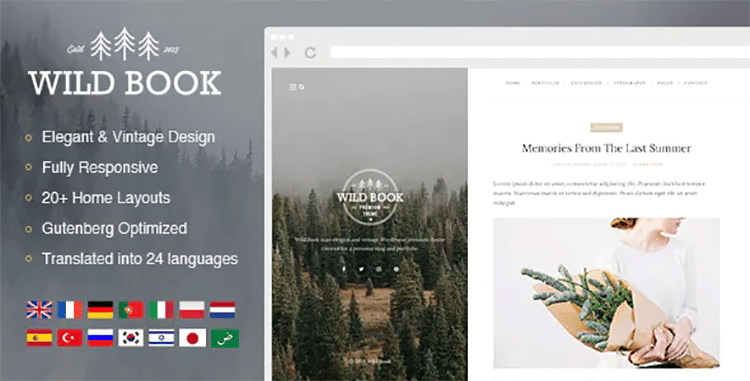
4. Writer – Powerful WordPress Theme for Writers, Authors, and Poets
The writer is a great theme for poets. Although it’s not a design exclusively for when you write poetry blogs, it’s a classy and elegant theme that is very easy to customize to your own poetry needs.
5. The Novelist: Responsive WP Theme for Writers
This is a pretty niche offering, which means that younot likely to find many designs related exclusively to publishing poetry. However, many themes, like this one from theme Forest, make it easy to customize and create suitable designs for your own poetry blog.
If none of the themes above appeal to you, you can search on some of the online theme marketplaces like ThemeForest, StudioPress, and MyThemeShop to find a design.
Follow the criteria below to help you choose the best theme for your new blog.
What to Look for in a Great WordPress Theme When Writing Poetry Blog:
- Speed: The theme should be fast
- Responsive: It should be mobile responsive
- Customization: The theme must be easy to customize
- Support: It should offer great support for readers and creators struggling with basic steps
- Ratings: It should have great ratings and reviews online
- Brand: The theme should come from an established and reliable brand
7. Create Essential Pages & Logo
This is undoubtedly the most important page on your own poetry blog for your main menu. That’s because many people and readers who will read your work are going to want to get to know you a little better.
You must include information about yourself, who you are, and what you’re all about on this page. Share why you started a poetry blog and what people can expect from your blog.
Make it friendly and fun, and don’t be afraid to let your personality shine through. You can also include a photograph of yourself on this page.
Since a lot of your audience will be checking this page out, you might also use it as an opportunity to encourage them to connect with you on other platforms, such as social media or signing up for your email newsletter and blog post.
Contact Page
This page should have all the information your readers might need to get in touch with you. Ideally, you must have a variety of ways for your audience to connect with you, including:
- An email address
- A form that they can fill out right on the contact page
- Social media buttons
- A telephone number
- An address
Make sure that you monitor all of the channels you include on this page to give your audience timely responses to their questions, comments, and feedback.
Privacy Policy for your Own Poetry Blog
Your new poetry blog needs a Privacy Policy page and other legal pages, such as a Disclaimer, Terms of Service, Cookie Policy, and more on your blog in the form of a blog post.
These legal pages are extremely important, and if you are not sure how to craft them, it’s best to get the help of a professional or use a privacy policy generator.
Create a Logo
It’s an excellent good time to focus on creating a logo for your poetry blog. There are many different ways to do this, including Canva or Tailor Brands (Full Tailor Brands Review Here), which is a much better option.
I think it’s a good idea to create a logo at this point now that your blog is all setup.
You can do this quickly and affordably with one of these online logo makers.
8. Begin Blogging
In this section of my guide on how to start a poetry blog, we’ll discuss how to start writing and posting your content.
As a writer, this will probably be the most fun step for you before your poetry is published online. But, before creating your first post, you must first choose a category for it.
Depending on your niche for your poetry blog, you can divide your main topic into various subcategories.
For your first post, you may consider writing a simple announcement way you set the scene for your blog readers. In the post, you can discuss why you’re starting a poetry blog, what you’re hoping to accomplish, who your influences are, and the different things your poetry will cover.
Writing blogs is hard work, but if you only post once in a while, you will have difficulty attracting a following.
That’s why it’s crucial to publish regularly to keep your blog interesting. Use the topic ideas below to ensure that you always have something that you can write about on your blog:
Ideas for Poetry Blog Topics
- Use the creative writing prompts to get inspiration
- Choose a monthly theme that you can write poems around
- Use National Poetry Month as an anchor for your writing
- Write reviews of some of your favorite poetry books
- Craft responses to some of the great works of other poets that you are reading
You can also look for inspiration on other poetry blogs. Read their posts to find trending topics and ideas for your own blog.
Some of the more popular blog post websites that regularly publish interesting content on your poetry website include:
- All Poetry
- Pixie Poetry
- Kavita Kosh
- Hello Poetry
- Rekhta (dot) org
- Write out Loud
- Poem Shape
- The Poetry Project
- Eat This Poem
A Few Poetry-Specific Tips
When you begin sharing your poems and blog posts, focus on keywords as part of your marketing strategy.
For instance, you will find that most people search for terms like “narrative poetry “or “haiku poems,” neither of which will occur naturally in the body of your poems. Unfortunately, this means that Google won’t see these terms, which will make it hard for your poems to rank high.
So what should you do?
The solution is to introduce your poems. Then, write a short intro paragraph for each one you publish on your site that doesn’t over-explain your poem or take anything away from it. This is where you can add your keywords.
This book from Czeslaw Milosz is a perfect example of using intros to include important keywords on your pages for your own website with an up-to-date WordPress website.
Important Note: Before you begin promoting your new blog and products like a poetry book, make sure you have at least ten posts published. When you invite people to check out your blog, you want them to arrive at a populated, professional-looking blog instead of one that screams “amateur.”
By the time your blog goes live, make sure there’s enough thought-provoking content and posts to attract different segments of your audience and more readers and keep them engaged on your blog for longer.
9. Promoting Your Poetry Blog
Some people believe that you can’t be a creative and a marketer simultaneously, but this couldn’t be further from the truth. As a poet, you are your own marketer. Some would argue that you are the very best marketer globally as you will be marketing what you have created.
You can promote your blog and build a strong following by following the steps listed below.
Friends and Family: The first thing to do as soon as your blog goes live is to share it with your family and friends. These are the people that are most likely to want to support you.
They will be happy to check out your blog and give you feedback and advice if any improvements are necessary. Also, you can ask them to share your blog with their own network of friends, thereby growing your exposure significantly.
Social Media: If you are already active on social media, you should share your new blog on your social profiles. Post the link and ask your followers and fans to check out your poetry blog on many social platforms.
Social media is a great place to attract targeted readers, mainly if you can go where they are already gathered, such as in poetry-focused groups or forums. When you publish new posts on your blog, always share them on these social spaces to drive traffic to your blog.
Poetry Clubs: Poetry clubs are where groups of poetry lovers hang out. You can join these communities to meet local poets or connect with other poets worldwide.
Make sure you don’t spam the group with your link, but rather connect, interact with others, and provide real value. The group or forum members will be happy to check out your poetry blog in exchange.
These are just some of the most influential blog promotion methods.
However, if you want your poetry to be recognized, don’t forget to keep promoting your blog in every way possible.
Include social media share buttons on your blog posts, so your readers can share your work with their friends. Also, invite everyone in your email contacts to visit your blog and add your blog link to your email signature.
10. Earn Money by Writing Poems
Some believe that a poet’s main source of income is the money he makes in their day job. But, by following the steps below, you can join the ranks of the many financially successful poets like Rupi Kaur.
Implement some of these monetization methods on your website and continue to work on them consistently. Before long, you will have a reliable source of income from your poetry blog posts.
Affiliate Marketing: Affiliate marketing is great for a new poetry blog. It doesn’t require you to amass a huge audience to start making money. You can still monetize your blog posts using this technique even with a small following of poetry fans.
All you have to do is sign up with an affiliate network like Amazon or Click2Sell, and you can begin recommending their products (e.g., Writing Poetry Books, Writing Courses, etc.) to your audience and earn a commission each time a sale is made.
Magazines and Anthologies: Many poets make money by regularly submitting poems to poetry magazines and literary journals, as well as anthologies and paying websites that welcome poetry. You can do the same. This not only helps you create an additional source of income but also helps to generate even more awareness for your work.
Information Products: As a poet, you can publish your own books or collections of your poetry. Traditional publishing deals are rare, but self-published books are becoming increasingly popular, and they can bring in a surprisingly huge amount of money.
Although this may require an investment of time, effort, and a bit of money initially, it’s a reliable way to create a stream of passive income for yourself.
Google Adsense: This is among the easiest ways for beginner poetry bloggers to make money from their blogs. Signing up for Google AdSense is quick and easy, and this monetization method requires very little maintenance once it’s up and running.
Once you sign up, Google starts showing ads on your blog, and you will be paid a small amount for every visitor who views the ads. Over time, this can add up to a nice stream of income. Also, as your traffic grows, you can try different ad network alternatives to maximize earnings from your blog.
Teach Poetry: Teaching is a great way for talented poets to make money. There are a lot of community programs, schools, and colleges that like to offer poetry classes. If you are a qualified poet, you may be able to take advantage of these opportunities to create another income stream while doing engaging and rewarding work.
How to Start a Poetry Blog: The Final Word
Now you know how poets make money. In addition to the income sources listed in this guide on how to start a poetry blog, there are many other poetry-adjacent activities that you can employ to create even more streams of revenue, including booking speaking engagements and signing up for poetry readings where you can sell your books afterward.
So if you ever hear anyone say that poets can’t make money, you know that they either don’t know about all the different ways to monetize a poetry blog, or they simply don’t know how to take advantage of the resources at their disposal.
Either way, you now possess the knowledge to start a successful poetry blog and turn it into a profitable revenue stream.
All you have to do is follow the steps in this article, and you will be able to start making money doing something that you love.

That was a lot of reading. I am so glad I took the time to do just that. Thank you very much, it is a most informative article which will surely help me to set up my own poetry blog. I am a writer of poetry, short stories and essays, member of various groups and forums for many years and it is high time I started a blog of my own. Not knowing how to do that has kept me from realizing my dream. Thank you
again.
Glad you enjoyed, Marjon!
Useful
Glad it helped you!
thank you for that uplifting information
No problem, Ashley!
This is a wonderful bunch of information. Thank you! I have been a writer for 36 years and have quite a bit I want to share with the world. This helped me believe I can do it!
You really can, it’s not as mythical as you may think. Glad I could help!